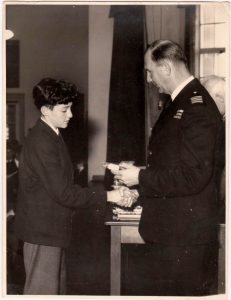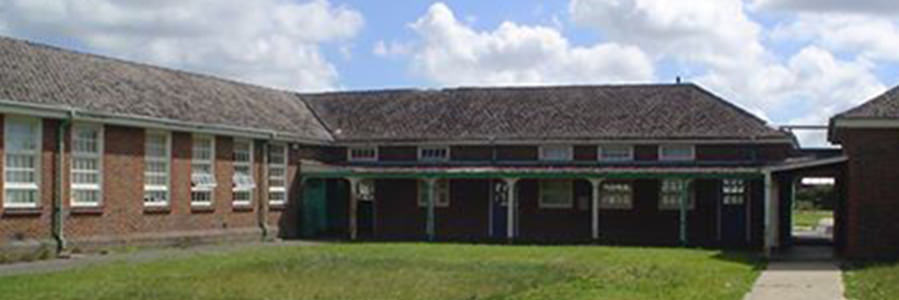 Speech Day circa 1956.
Speech Day circa 1956.
Ian Walters receiving his prize. Can anyone identify the dignitary, please?
Here is a story that is not trivial. Not at all, for I have come to think that it is quite likely a major, albeit subconscious, reason for my leaving England in 1973. It was certainly the reason why it took me so long to graduate. The West Sussex County Council agreed to fund my repeating a year at university. It all began quietly and unremarkably, on the wide sidewalk nearby the Manchester University Students’ Union building at about a quarter to eleven one dry and calm Saturday evening in October 1964. I was walking with friends just to the south of the Union, strolling to get my car, which was parked on the main Oxford Road only about twenty yards from the Union steps.
Having left home and my studies just 60 minutes previously, I was there simply to meet up with friends. I hadn’t been inside the Students’ Union. It was too crowded on those famous Saturdays, with performers such as the Kinks and the Animals drawing huge numbers. I was with about ten friends, some of whom were not active students, but teachers or social workers. Close by my car a solitary foot-patrol cop had unaccountably taken it upon himself to try and move in a single direction the entire throng of students exiting from the Saturday night dance. It was Manfred Mann that week. The constable saw that I was not turning round and walking away from him, which is what his gestures and shouts were demanding of all of us.
He then addressed me specifically, telling me to move in a direction away both from him and from my car, which was no more than ten feet away, just behind him. I pointed to my car, saying “Look that’s my car, why do you want me to go in the opposite direction?” You could say that I remonstrated. Out of the blue, he smashed me across the left temple with his torch or truncheon. I went down, unconscious. A crowd instantly gathered around. They weren’t – as I believe they say in England these days – best pleased. The copper was forthwith tumbled to the ground by the crowd, where some bright spark decided to put the boot in. At that time and at the time of the subsequent Court trials, I had no idea who did the kicking and injuring. But a couple of years later I was told that it had been a non-student visitor from London.
Anyway, a police van was passing by and saw the mêlée. It stopped, of course, and about five cops came out, saw their mate on the ground and me being helped to my feet by friends. They quickly concluded that I was the culprit, or more likely that I would make a good one; so in short order they hauled me away from my friends’ grasp. The hurt cop, a 6′ 2” ex-Marine, was taken by ambulance to hospital. GBH it was later to be called (Grievous Bodily Harm). That was to be the charge against me. GBH on a police officer is pretty serious. My shirt collar and tie were twisted by the cops who had grabbed me, so that I could barely breathe. I was bundled into the back of the paddy wagon with four cops. I was thrown around, pushed and punched inside the moving van all the way to Rusholme police station. There I was interrogated and bruised some more, with punching and pinching, until 4 a.m. when I was released on some kind of bail.
There was the good cop / bad cop interrogation technique. There was the “What do mean you want to see a doctor? You should have asked before, I have already asked ten times” technique. The bruises were many and obvious, and I wanted a doctor to witness them. Meanwhile, unknown to me, in another part of the police station eleven friends were trying to make statements (that the police did not want to take down) attesting that I did not do anything wrong. Some of them – God bless ’em – were still protesting there when Sunday dawned and I was out on bail and home in bed already. At the three-day no-jury magistrates trial, spread over three weeks, and at the later Crown Court appeal trial of similar time-frame, I sat in the dock and listened to a succession of senior police officers perjure themselves in the witness box. Some of them I had never seen before. They swore they had seen things that had not happened. They swore they had seen me do things I did not do. They swore that I and they had said things in the police station that had not been said. It was hard for me to keep quiet in the Courts, I can tell you.
At one stage the prosecution offered to drop the GBH charge and replace it with a lesser one, which I refused, as I would not admit to any wrongdoing. I had eleven witnesses testifying that I did not do anything wrong and that the policeman had hit me and that I had not touched him. When the three magistrates’ guilty verdict was announced, there was a loud thump from the spectators’ gallery high up behind me. Later I was told that a young lady had fainted. Released on bail pending appeal, I telephoned by prior arrangement my mother and father 200-plus miles away in Chichester at the coin-operated call box in the Regnum Club. That was a couple of hours after the guilty verdict was handed down. We had no home telephone. I had to tell them the verdict and the sentence – a month’s imprisonment. That was for a first offence of any kind. The date was November 18th 1964, my 21st birthday. It was a million times harder for my mother than it was for me. She died three years later at the age of 54. Some weeks later, the appeal was heard. Different Court. And a real Judge this time – on his own, but again with no jury. The rest of those present were much the same cast of characters. The duration was the same – three full days, spread over the course of three weeks. The plot was much the same – almost the same questions and answers and statements and witnesses and cross-examinations. And the same truth and the same lies. I had a different barrister.
And there was a new witness testifying for me. He hadn’t come forward at the time of the first trial simply because he did not think he had anything relevant to say. But when he heard about my conviction the dear man offered to attend the Appeal and testify to the little that he had seen. He told the Recorder that he had witnessed my being dragged out of the crowd by the policemen and having my collar dangerously twisted and being bundled roughly into the police van. It was no more than I and most of my witnesses had already stated under oath at the first trial. The difference this time was that Bert Shipley was a man that the Court saw as being of absolute integrity, with no axe to grind one way or the other, a man who had come forward voluntarily to tell the truth, no matter how tiny that truth was. It is my view that his testimony was crucial, in that the judge was suddenly given a reason logically to conclude that if I had been telling the truth about that one small part of the story – and surely it was clear now that I had been, given the corroborating and unchallengeable evidence of Mr. Shipley – then maybe I was telling the truth about it all. My father, as a Special Constable during the London Blitz, gave character testimony. I found out later that a representative from a UK civil liberties organisation had been present in Court throughout the appeal. The judge (the ‘Recorder’) was thus primed to listen to all the evidence objectively and figure out what was the truth and what was likely not the truth, and not base a verdict on the Victorian prejudices and preconceptions that had blinded the three magistrates in the lower court. Mr Shipley was the Students’ Union concierge, an elderly man and an ex-serviceman, who sat at a desk front-centre in the Union building lobby, a man who knew everything a student ever needed to know and who, bombarded at all times with questions from all sides, nonetheless had all the time in the world for everyone. He had been walking from work on his way home when he saw the incident. A few minutes after I was acquitted on appeal by the Recorder of the Crown Court I was told by the prosecuting Detective Sergeant outside the courtroom that they knew who really did it. He did not say who. Oh, and a footnote; the case was a running item in the Manchester Evening News, front page sometimes, although only a tiny piece of it. Following my acquittal, I was walking cheerfully down the suitably grand steps outside the Crown Court, about to have my picture snapped by the Press, when a window opened from way up above us all in the Court building. A head stuck itself out and bellowed “Taking photographs of the Court while in session is Contempt of Court. If that picture is taken, you’ll be arrested.”
NB A couple of years later the policeman who had started it all was involved in a very similar incident. This time the witnesses were believed and the policeman was kicked out of the Manchester Police. His senior officers, who had conspired to present false evidence against me, continued with their careers.

